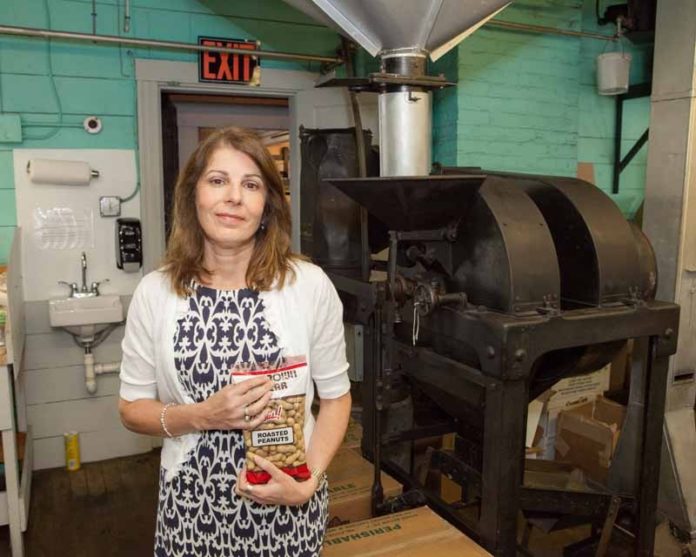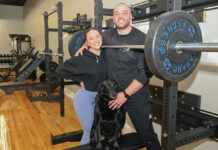
Cars or nuts? When Peter Kaloostian arrived in Rhode Island from his native Armenia in the early 20th century, he was advised to stake out a future in one of those two then-high-growth, emerging markets.
More than a century and four generations later, Virginia & Spanish Peanut Co. President Candace Kaloostian doesn’t know why those were the only two career choices her great grandfather considered.
And she doesn’t know why he chose nuts.
But while peanut roasting never reached the commercial heights of the American automobile industry, it worked out well for the Kaloostian family, which has run Virginia & Spanish Peanut with remarkable stability since 1913.
On roasting days, which include every Monday, the smell of hot nuts has become familiar to anyone in the blocks around Virginia & Spanish’s two-story wooden factory on Dexter Street in the city’s West End.
“A lot of people tell me stories about being 5 years old smelling the peanuts roasting, or how my grandfather would give them bags of nuts,” Candace Kaloostian said. “We still have roasters close to 70 years old, and they work so much better than the new ones, which wouldn’t last 50 years. Even on a small level, if we say we are thinking of painting the office another color, the customers say ‘Don’t do that.’ ”
Of course, like any company that’s survived the cultural, technological and economic shifts of 100 years, Virginia and Spanish Peanut has grown with the times.
Raw and roasted nuts remain the foundation of the company’s sales, but they are now supplemented by a number of other foods, including a range of dried fruits, trail mixes, seeds, snacks, candies and peanut butter.
Peter Kaloostian may not have known what to make of the dried mango and wasabi peas the company now sells, but they are not going away.
For a Providence company, the name Virginia and Spanish may seem odd, but it’s not to those in the peanut world.
Virginia is the name of the most commonly consumed type of peanut, the irregular, hour-glass shaped object with a tan skin found in ballparks and taverns across the country. They are mostly grown in Virginia and North Carolina.
Virginia & Spanish sells both types in bulk raw and roasted.
Then there are the real nuts – peanuts are legumes – the company sells in bulk: almonds, Brazil nuts, cashews, pistachios, macadamias and pecans.
Most of Virginia and Spanish’s business is wholesale, but over the years demand from the neighborhood convinced the company to sell some nuts retail from Dexter Street, even though the building isn’t set up for it.
“Neighbors would smell the nuts roasting and would come in and asking for them and then one thing led to another,” Kaloostian said. “We do no advertising, but word of mouth spreads and people come in.”
Like most of her family, Kaloostian grew up around the peanut factory as her grandfather, Leon, then father, Peter, ran the business, but she hadn’t intended to succeed them.
Initially, she had wanted to become an elementary school teacher, but when she got out of college, schools were cutting back and her grandfather’s health was slipping, creating a need for help at the factory.
Once she learned the business, she just settled into it. And since her father retired, she has run it with her two sisters, Shelley Kaloostian-Conti and Ellen Ferrara.
Looking to the future, Kaloostian said Virginia and Spanish is likely to steadily add new items while continuing to focus on the core peanut-nut business, which still represents about 70 percent of sales.
Over the last five years or so, Kaloostian, whose favorite nuts are almonds, said nuts have become more popular with health-conscious consumers, which has helped drive business.
Along with adding more snacks, the next move for Virginia and Spanish Peanut is likely toward Internet sales. The company’s current website is informational, but Kaloostian said she is exploring adding the ability to make direct sales.
“We are always trying to keep an open mind and add a few things,” Kaloostian said. “We always try to listen to customers and have gotten into ice cream toppings.” •
COMPANY PROFILE
Virginia & Spanish Peanut Co.
Owners: The Kaloostian family
Type of Business: Nut wholesaler
Location: 260 Dexter St., Providence
Employees: 8
Year Established: 1913
Annual Sales: NA












